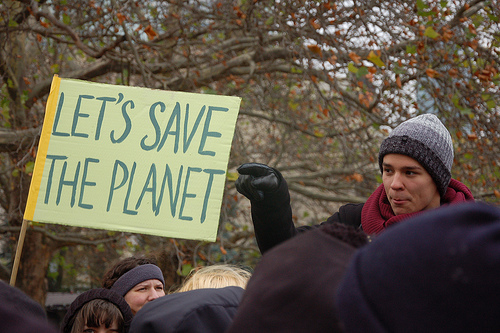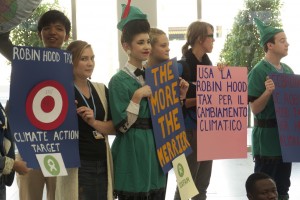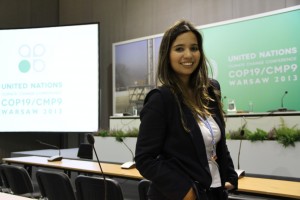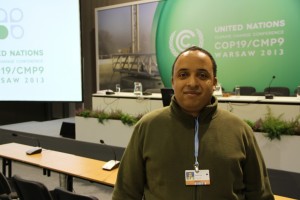Search Results for Tag: conference
Impressions from the UN climate summit in Warsaw
Journalists from all over the world come to Warsaw to report on what is happening at the 19th climate conference. In a short interview four of them describe their impressions.

On November 16, people from around the world took to the streets outside the UN Climate Talks in Warsaw (COP19) to demand climate justice. (Photo credit: CC BY NC SA 2.0: Jamie Henn/350.org)
What are the most pressing climate issues in your home country? Are those issues addressed at all in this conference?
Giuliana Miranda, Brazil: The intensification of the extreme weather events is a hot topic in Brazil. As presented in the last World Meteorological Organization report, released earlier this week here in Warsaw, the water cycle has already changed in my country. We are facing severe drought in several parts of the the territory, specially the northeast and in central Brazil. Fortunately, the subject is being discussed here, but it doesn’t mean we are getting closer to a solution.
Jessly Obando, Nicaragua: Diseases related to climate change. There really is not as much information as I would like, especially in the Central American region.
Esteban Bonco Lugo Perea, Colombia: Carbon market projects, which so far have been addressed but not specifically about my country or the region.
Nivedita Khandekar, India: India may not need finance but it is taking up cudgels on behalf of the developing countries. Emission reduction is an issue and I am confident our negotiators are not going to budge to the demands of rich countries. Also, India has successfully managed to remain out of the trap – and also lead all developing countries – where rich countries wanted poor countries to include agriculture and cattle related emissions.
Bhrikuti Rai, Nepal: This year’s delegation focuses mainly on financing for the national adaptation plan and pushing for the loss and damage in every platform. However, the pressing climate issues remain: dealing with erratic rainfall, melting glaciers and the risk of glacier lake outburst flooding and most importantly dealing with the aftermath of theses kind of disasters. But during this COP, these issues will likely be lost in technical jargon which is more related to the financial aspects.
How is the performance of your Delegation so far? Do they try to solve the problems or are they part of the problems?
Giuliana Miranda, Brazil: Brazil kept a team of very experienced delegates during the last meetings, but for various reasons, the main representatives of the delegation have changed in 2013, including the chief negotiator. He might have faced some scepticism at the beginning, but seems to be doing a good job. The Brazilian proposal to look at the historical responsibility for global warming is now a position for the entire G77 group and China.
Jessly Obando, Nicaragua: Well, so far they have only been devoted to criticizing, but I see that they are now contributing to a change.
Esteban Bonco Lugo Perea, Colombia: After speaking to the chief negotiator of my delegation, I must say the government has good intentions and is doing everything it can to have as best an outcome as possible.
Nivedita Khandekar, India: They are very good negotiators. Not just for India, they have been successfully doing it for a whole lot of developing countries too.
Bhrikuti Rai, Nepal: Although Nepal chairs the group of least developed countries and it has made its presence comparatively visible compared to other COPs, the Nepali delegation doesn’t seem to be taking advantage of the new found visibility. From the meetings I have been to it is clear that the members of the core negotiating team are the biggest drawback when it comes to addressing the problems, most of them aren’t even from the government and even if they are they are not from the departments concerned, so their presentation so far has been very superficial without really getting to the heart of the matter.
What do you think of the UN Climate Summit in Warsaw in general? Is it just a talk shop or a chance for real action?
Giuliana Miranda, Brazil: I think the parties do have a chance to start to make a difference here. We know this conference will not produce any kind of revolutionary agreement, but it’s a chance to set the basis for achieving commitments [at the UN climate summit] in Paris in 2015.
Jessly Obando, Nicaragua: I think they have the power to decide but not the will and those who really want change are seen as fanatics. In the first week I was disappointed and I truly hope that this week will see something more concrete.
Esteban Bonco Lugo Perea, Colombia: It must be an opportunity for action. The world will not forgive otherwise.
Nivedita Khandekar, India: The COP19 at the end of its first week does look like it is going to be only talk, talk and more talk. The rich nations, especially the USA, seem in no mood to work out a deal. But as Christiana Figueres, the COP executive secretary, said today, there is still time for hope. Fingers crossed.
Bhrikuti Rai, Nepal: I think UN Climate Summits help put on the table many pertinent climate issues but the fact that the bigger economies have the most say in these talks and they are the ones really steering the direction of the entire summit, the chance for real action is missed somewhere along the line when these countries decide to backslide on the commitments and pledges. The summit in Warsaw still has a week to go so it still cannot be said how the talks are going to turn, but the fact that the host country itself does not seem very keen to steer away from cheap fossil fuels, means that it is likely that the bigger economies might yet again postpone dealing with the pressing issues until next year.
Polluted policies and Robin Hood taxes
 Author: Kerstin Schnatz
Author: Kerstin Schnatz
At the beginning of the second week of climate negotiations in Doha, activists from around the world showed their state delegates how to make the conference a success. Redirecting the flow of money was at the top of the agenda in two actions.
Take it from the rich
Wind farms, solar panels and biogas plants are a great idea to tackle climate change – but they do not come for free. Especially developing countries struggle to raise the money for green energies. On the other hand, those who live in industrialized countries and are thus most responsible for today’s climate change, have much more money. So why not take it from the rich and give it to the poor? In our short video, Tim “Robin” Gore from Oxfam explains the idea of a Robin Hood tax.
Tim Gore, Oxfam International from DW_Global Ideas on Vimeo.
Kick out the fossil fuel lobby
According to a activists from SustainUs and the Young Arab Climate Movement (YACM), the industrialized countries should clean up the mess in their own backyards first. Such as Canada who has been awarded the “Fossil of the Day Award” today – in memory of having been the first country ever to have formally pulled out of the Kyoto Protocol.
The negative award for her own country will not surprise Neelam Khare. The student from Vancouver stresses, that Canada could have long taken the lead in changing its own energy production towards renewables, if the influence of the oil industry wasn’t so big. Hundreds of thousands of dollars were spent on lobbying every day and millions “to fund think tanks that publish denialist junk science” to discredit climate change as a real problem.
Neelam Khare, Canadian Youth Delegation (CYD) from DW_Global Ideas on Vimeo.
How to plant a tree inside a building
Authors: Kerstin Schnatz, Klaus Esterluss
They came to COP18 in Qatar to open the eyes of the negotiators, young students from different parts of the world had an idea about how to really grow roots in the heads of everyone at the climate conference. The organization YOUthinkgreen planned to plant a tree made of garbage inside the conference building. The people at the conference should use their “Tree of Hope” to pin their own demands, wishes or fears on it. But a garbage-tree was not allowed on site. So Luisa from Germany, Pavlos who lives in Doha and all the others from YOUthinkgreen had to find another way to bring their message to the conference. They invented the human tree and the tree grew strong and it’s leaves meaningfull and lush:
Green leaves, green hopes: Young participants plant the “Tree of Demands” at COP18 from DW_Global Ideas on Vimeo.
One of the leaves was written by Ahmed from Qatar, whose thoughts about cars are still not very common in his home country:
Ahmed from Doha on how to make Qatar a greener country from DW_Global Ideas on Vimeo.
Climate Travel Guide to Qatar, COP18 in mind
Qatar is the first Middle East country to host a major UN climate change conference. Traditionally, host countries have a big responsibility – their diplomatic skills can make a conference outcome a fail or a success.
This year, the Qatari government has a lot on the plate: A new trading scheme for CO2 emissions has to be found. The old one, agreed in Kyoto in 1996, ends in just a few weeks with the beginning of the new year.
To get a better idea of the oil rich host country of this years Climate Summit, we put togethter some facts and figures for you:
Capital: Doha
Number of inhabtiants: 1.9 Million
Ethnicty: Arab 40%, Indian 18%, Pakistani 18%, Iranian 10%
Religion: Muslim 77.5%, Christian 8.5%, other 14%
Energy mix: 100% electricity from fossil fuels
CO2 emissions per capita: 40 tons per capita. That is the largest in the world.
Food and water resources: produces fruits, vegetables; poultry, dairy products, beef; fish, before Qatar became a big player in oil and gas it was a poor pearl fisher country
Industries: liquefied natural gas, oil production and refining, ammonia, fertilizers, petrochemicals, steel reinforcing bars, cement and others
Civil Society: mixed legal system of civil law and Islamic law
Qatar is probably not the first place you have in mind for a climate conference. We also thought about it and came up with this little information film about the sense or non-sense of climate conferences like COP18:
Rio’s romance with renewable resources
Author and pictures: Kerstin Schnatz
Cups made from corn or electricity from sugar cane: Rio is eager these days to show that it can be environmentally friendly. The city is hosting the United Nations conference on Sustainable Development – better known as Rio+20. While the official part is only starting on Wednesday (June 20) the congress venue is already open for preparatory meetings and non-governmental events.
The Brazilian government is trying to make a point, it seems, of just how much it values the use of renewable resources such as corn or sugarcane. Indeed, Brazil is well known as a biofuel-country: The standard blend cars run on consists of up to 25 percent of biofuel for example. Even the Brazilian airline that flew us in bragged about its green commitment in the inflight magazine. The carrier plans to operate a domestic flight on biofuel especially for Rio+20.
Whilst renewable resources may emit less CO2 than fossil fuels, depending on how they are processed and transported, they can of course also create a lot of problems – monocultures, conflict between food and fuel production or soil degradation to name just a few.












Feedback